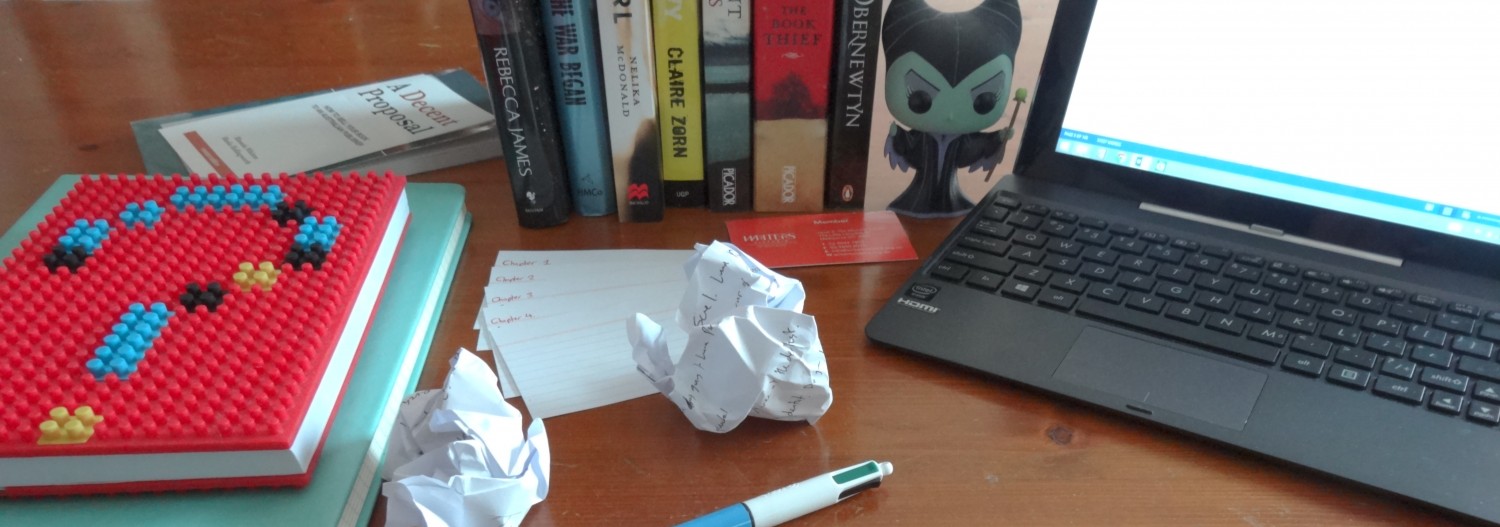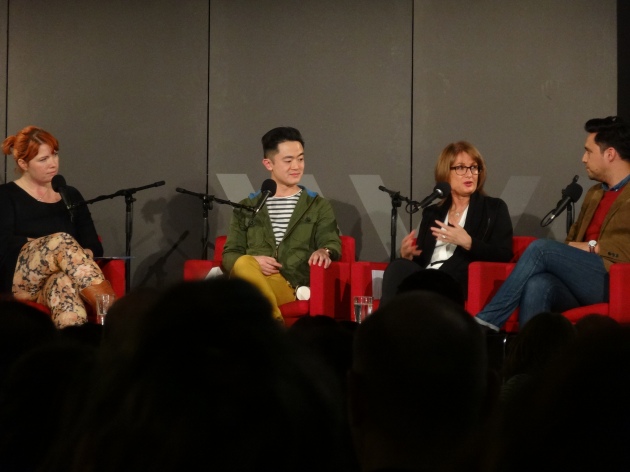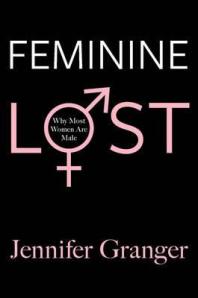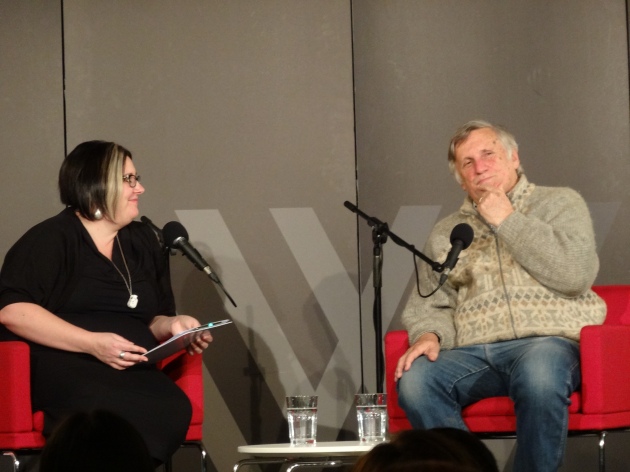Last night I went to ‘Men Overboard: Blokes, Wimps and Mates’ at The Wheeler Centre. The focus of the panel was to ask what it means to be a male in the 21st century. Clementine Ford chaired the panel. She opened the evening by suggesting that masculinity in today’s society equates once again with physical strength. She invited her fellow panellists to discuss what they perceive to be the current ideals of masculinity and whether today’s society has taken a step forwards or backwards. Clementine ended her brief introduction by quipping about her position as emcee by paraphrasing Tony Abbot – ‘there are at least three men in my family so I am qualified to lead them’.
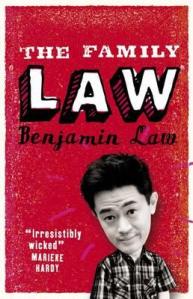 Benjamin Law referred to his collection of personal essays, The Family Law, to discuss his experience of masculinity anxieties he had growing up, which he said were primarily about his physicality. He jokingly referred to himself as an ‘Asian hybrid man-child thingy’, as he has full lips and developed a deep voice and a complete lack of forearm hair. Benjamin commented that ‘Gay Australia’ is ‘incredibly white and ‘people would never suspect you could be a racial minority and gay’. He argued that the problem with any questions of masculinity is that ‘how we present as masculine or feminine is always someone else’s business’.
Benjamin Law referred to his collection of personal essays, The Family Law, to discuss his experience of masculinity anxieties he had growing up, which he said were primarily about his physicality. He jokingly referred to himself as an ‘Asian hybrid man-child thingy’, as he has full lips and developed a deep voice and a complete lack of forearm hair. Benjamin commented that ‘Gay Australia’ is ‘incredibly white and ‘people would never suspect you could be a racial minority and gay’. He argued that the problem with any questions of masculinity is that ‘how we present as masculine or feminine is always someone else’s business’.
Jennifer Granger referred to her book Feminine Lost – Why Most Women are Male to argue that men and women are made up of both masculine and feminine qualities, and the combination of masculine and feminine features determines how we interact with the world. She believes what happens to women will have a corresponding effect on men, and vice versa. She described the emergence of what she sees as a ‘highly feminine man’, who doesn’t enjoy confrontation, has difficulty facing decisions and is receptive (but does not initiate). Jennifer believes there is a masculine and feminine role in every heterosexual relationship and a ‘butch’ and ‘feminine’ role in every homosexual relationship. She also categorised the ‘macho man’ as ‘almost Neanderthal’, and the ‘pseudo-masculine’ as a man nursing wounds from unfairness of loss of privilege after the rise of the powerful woman.
Ben Birchall used a slideshow in his presentation, which he titled ‘masculinity 2.0’.
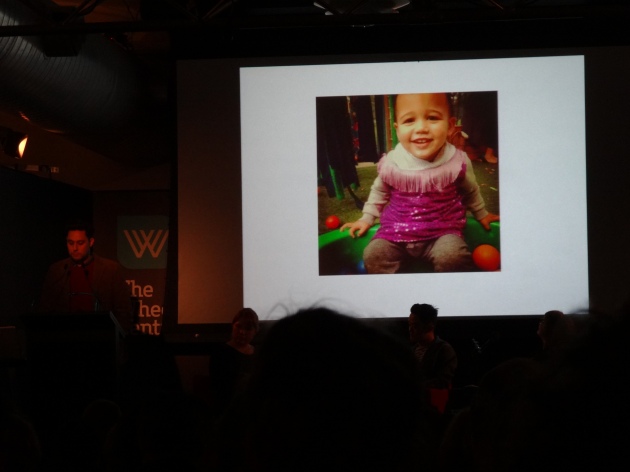
Ben’s slide show featured a photograph of his son wearing a dress, which he used to illustrate the need for children to be free to explore their own identity
He quipped that he is part of the problem, as he identifies as ‘a masculine man’. Ben believes there currently is a nostalgic view of masculinity, of 1970’s moustached, beer-swigging Dennis Lilly to compensate for the previously idealised super-buffed and preened David Beckham world. Mateship is paramount in this nostalgic masculinity, which involves sport and a ‘fetishism’ of ‘male time’ away from women. Ben suggests this type of masculinity is just as rigid as its predecessor. Fatherhood ‘allows you to play a masculine role’, prompting Ben to explore what masculinity means to him and to ask himself how he can raise a good son. Ben believes masculinity is an impossible archetype. He said 1 in 8 men suffer depression, men are twice as likely to self-medicate, and 80 percent of suicides are men. Ben believes ‘manhood is too hard to define’, and if men were ‘concentrating less on being better men, it might free them to be better people’.
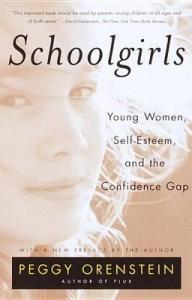 Clementine suggested the unforeseen side effects of feminism is the perceived sense of emasculation and resulting blame on women. Referring to School Girls: Young Women, Self Esteem, and the Confidence Gap by Peggy Orenstein as a reference point, Clementine argued that some men perceive equality as a loss, as legislation that empowered men and restricted women has been removed. Ben Birchall acknowledged the many inequalities that women still face, but also argued that men are disadvantaged in health services. Jennifer commented that we have lived in a patriarchy for over 4,000 years, so any change will be gradual.
Clementine suggested the unforeseen side effects of feminism is the perceived sense of emasculation and resulting blame on women. Referring to School Girls: Young Women, Self Esteem, and the Confidence Gap by Peggy Orenstein as a reference point, Clementine argued that some men perceive equality as a loss, as legislation that empowered men and restricted women has been removed. Ben Birchall acknowledged the many inequalities that women still face, but also argued that men are disadvantaged in health services. Jennifer commented that we have lived in a patriarchy for over 4,000 years, so any change will be gradual.
Clementine questioned Jennifer’s binaries of masculine and feminine. Clementine argued that notions of masculine and feminine are socially created, saying ‘I don’t think those things are gendered’. Jennifer argued that masculine and feminine are internal in all of us. Ben Birchall commented that masculine and feminine binaries are alive and well on social media (and sell products to consumers). He later commented that Unilever owns Dove (who have the highly successful ‘Real Beauty’ campaign) and Lynx (with campaigns where masses of scantily clad women are drawn to a male after he sprays the deodorant). Also countering Jennifer’s belief that men possess both masculine and feminine qualities, Benjamin Law argued that grizzly, macho guys resent being told they can’t be what they are. An audience member later asked Jennifer what research methodology she used to support her masculine/feminine theory, particularly in relation to the butch/feminine in homosexuality, and Jennifer responded by referencing biblical archetypes.
Raising concerns about the nostalgic masculine man of Ben Birchall’s presentation, Clementine said celebrating ideals of masculinity with the mythology of mateship between men only, freezes women out. Benjamin Law commented on his upbringing in Queensland, which he described as a ‘concentrated version of Australia’. He said growing up ‘you have to decide what sort of man you want to be’, and he was fortunate enough to know he was gay at a young age (he came out at 17). Benjamin Law argued that Jennifer’s categorisations of ‘butch’ and ‘feminine’ homosexuals is heteronormative, and that any notions of feminine or masculine roles are constantly negotiated and changing internally, regardless of sexuality.
An audience member commented that there are numerous campaigns on raising young girls to challenge stereotypes (the Always #LikeAGirl campaign is a brilliant example).
She asked whether there are similar campaigns for men. Clementine mentioned an up-coming documentary, The Mask You Live In, which explores how the phrase “man up” is the worst two words you can say to a male, as it asks them to sacrifice their emotional side. More info on the documentary can be found here.
